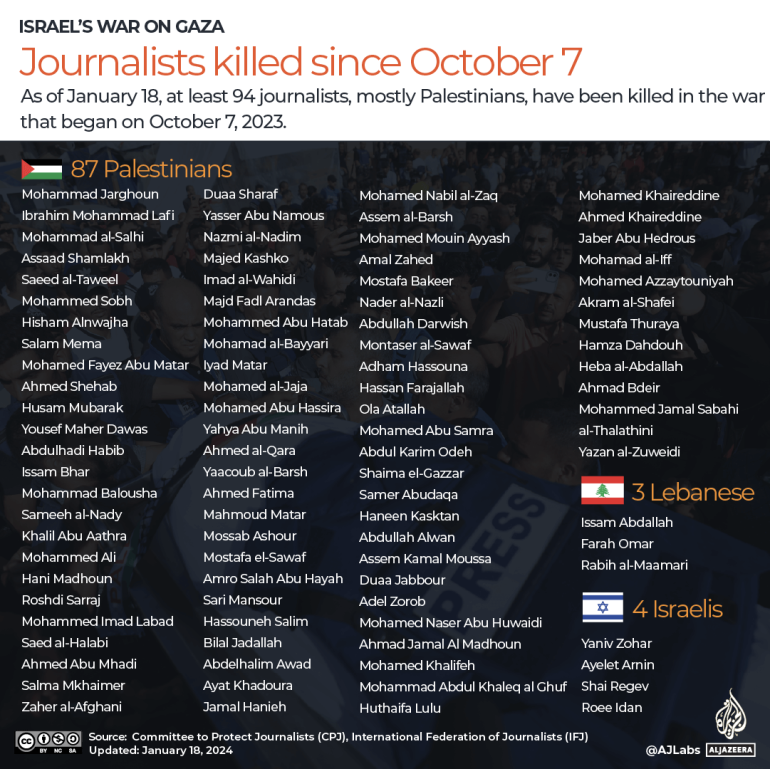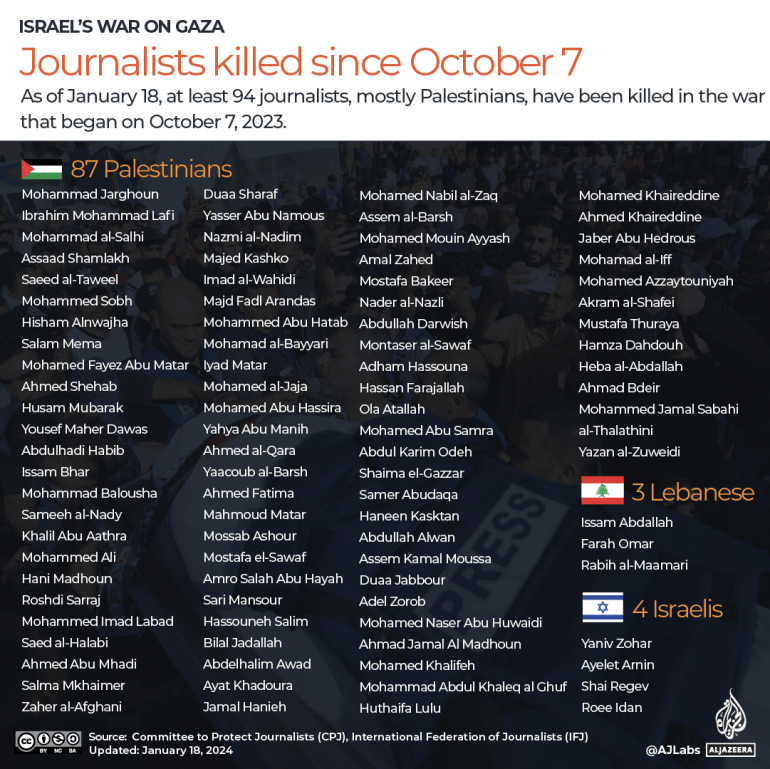Seventy-two of the 99 journalists killed worldwide in 2023 were Palestinians reporting on Israel’s war on Gaza, making those 12 months the deadliest for the media in almost a decade, according to the Committee to Protect Journalists (CPJ).
Killings of reporters would have dropped globally year-on-year had it not been for the deaths in the ongoing war on Gaza, the CPJ said in its annual report released on Thursday.
“In December 2023, CPJ reported that more journalists were killed in the first three months of the Israel-Gaza war than have ever been killed in a single country over an entire year,” the organisation said.
In total, it documented 77 journalists killed in the war on Gaza last year while doing their jobs: 72 Palestinians, three Lebanese and two Israelis.
The Palestinian victims account for nearly 75 percent of all journalists killed worldwide.
“This war is unprecedented in terms of the threat to journalists,” Jodie Ginsberg, president of the CPJ, told Al Jazeera from New York.
“What’s important to remember about this war is that Gazan journalists are the only journalists able to report on what’s happening inside Gaza. International journalists have not been able to get in, have not been allowed in, except on very, very controlled trips that are overseen by the Israeli army.
“So we are entirely reliant on those [Palestinian] journalists, who are risking their lives to bring us this story,” she added.
On February 7, the New York-based press freedom organisation said the number of journalists killed in the war on Gaza had risen to 85.
The CPJ has previously attacked what it calls the “persecution” of journalists by Israeli forces and is investigating whether a dozen journalists killed in the Gaza conflict were deliberately targeted by Israeli soldiers, which would constitute a war crime.
‘Journalists under threat everywhere’
Ginsberg said she was “disappointed … at the lack of public solidarity that we have seen” with Palestinian journalists during the ongoing war.
She said Western “hesitancy” to show solidarity with those targeted and killed in Gaza was “sadly unsurprising” given that Israel is “the country, the issue that has divided international media, international politicians more than anything”.
But she emphasised: “I think it’s really important that we let our colleagues inside Gaza as well as in the region know that we stand with them, that we are there to support them, so that we can make sure that press freedom and journalists are protected not just at this crucial moment in Gaza but also globally at a time when journalists are under threat everywhere.”

Worldwide, the CPJ report said the death toll of 99 reporters killed was the highest since 2015 and an increase of nearly 44 percent on 2022’s figures.
It said the greatest reductions in journalist fatalities in 2023 were registered in Ukraine and Mexico. Both went from 13 killings to two.
Fatalities remained stable in Somalia and the Philippines, the organisation said. However, it warned that Mexico – along with the Philippines and Somalia – was “one of the world’s deadliest countries for the press”.
“Compounding the situation, government agencies spy on reporters and rights defenders, and a significant number of journalists have had to leave their homes, and abandon their professions, due to violence,” the CPJ report warned.
In the Palestinian territories, even when journalists are not on the job, they face the risk of Israeli bombardment or arrest. Gaza’s Government Media Office said at least 126 Palestinian media workers have been killed since Israel’s war began on October 7.
Journalists working in conflict areas are protected under international humanitarian law. Palestinian journalists accuse Israel of repeatedly violating that law by targeting the media.
“It’s very important that these killings are thoroughly investigated and that those responsible are held accountable,” Ginsberg told Al Jazeera.
She said her organisation was doing the work to document attacks against journalists in Gaza, which could later be used as evidence and presented to bodies such as the International Court of Justice or the International Criminal Court.
